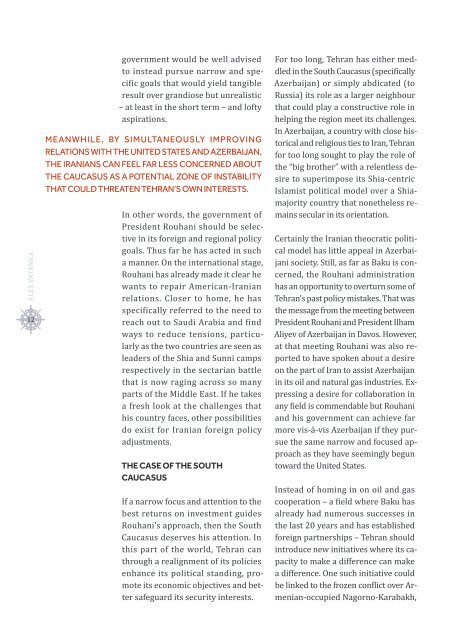Caspian Report - Issue 06 - Winter 2014
You also want an ePaper? Increase the reach of your titles
YUMPU automatically turns print PDFs into web optimized ePapers that Google loves.
ALEX VATANKA<br />
12<br />
government would be well advised<br />
to instead pursue narrow and specific<br />
goals that would yield tangible<br />
result over grandiose but unrealistic<br />
– at least in the short term – and lofty<br />
aspirations.<br />
MEANWHILE, BY SIMULTANEOUSLY IMPROVING<br />
RELATIONS WITH THE UNITED STATES AND AZERBAIJAN,<br />
THE IRANIANS CAN FEEL FAR LESS CONCERNED ABOUT<br />
THE CAUCASUS AS A POTENTIAL ZONE OF INSTABILITY<br />
THAT COULD THREATEN TEHRAN’S OWN INTERESTS.<br />
In other words, the government of<br />
President Rouhani should be selective<br />
in its foreign and regional policy<br />
goals. Thus far he has acted in such<br />
a manner. On the international stage,<br />
Rouhani has already made it clear he<br />
wants to repair American-Iranian<br />
relations. Closer to home, he has<br />
specifically referred to the need to<br />
reach out to Saudi Arabia and find<br />
ways to reduce tensions, particularly<br />
as the two countries are seen as<br />
leaders of the Shia and Sunni camps<br />
respectively in the sectarian battle<br />
that is now raging across so many<br />
parts of the Middle East. If he takes<br />
a fresh look at the challenges that<br />
his country faces, other possibilities<br />
do exist for Iranian foreign policy<br />
adjustments.<br />
THE CASE OF THE SOUTH<br />
CAUCASUS<br />
If a narrow focus and attention to the<br />
best returns on investment guides<br />
Rouhani’s approach, then the South<br />
Caucasus deserves his attention. In<br />
this part of the world, Tehran can<br />
through a realignment of its policies<br />
enhance its political standing, promote<br />
its economic objectives and better<br />
safeguard its security interests.<br />
For too long, Tehran has either meddled<br />
in the South Caucasus (specifically<br />
Azerbaijan) or simply abdicated (to<br />
Russia) its role as a larger neighbour<br />
that could play a constructive role in<br />
helping the region meet its challenges.<br />
In Azerbaijan, a country with close historical<br />
and religious ties to Iran, Tehran<br />
for too long sought to play the role of<br />
the “big brother” with a relentless desire<br />
to superimpose its Shia-centric<br />
Islamist political model over a Shiamajority<br />
country that nonetheless remains<br />
secular in its orientation.<br />
Certainly the Iranian theocratic political<br />
model has little appeal in Azerbaijani<br />
society. Still, as far as Baku is concerned,<br />
the Rouhani administration<br />
has an opportunity to overturn some of<br />
Tehran’s past policy mistakes. That was<br />
the message from the meeting between<br />
President Rouhani and President Ilham<br />
Aliyev of Azerbaijan in Davos. However,<br />
at that meeting Rouhani was also reported<br />
to have spoken about a desire<br />
on the part of Iran to assist Azerbaijan<br />
in its oil and natural gas industries. Expressing<br />
a desire for collaboration in<br />
any field is commendable but Rouhani<br />
and his government can achieve far<br />
more vis-à-vis Azerbaijan if they pursue<br />
the same narrow and focused approach<br />
as they have seemingly begun<br />
toward the United States.<br />
Instead of homing in on oil and gas<br />
cooperation – a field where Baku has<br />
already had numerous successes in<br />
the last 20 years and has established<br />
foreign partnerships – Tehran should<br />
introduce new initiatives where its capacity<br />
to make a difference can make<br />
a difference. One such initiative could<br />
be linked to the frozen conflict over Armenian-occupied<br />
Nagorno-Karabakh,










